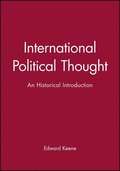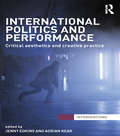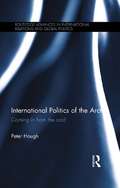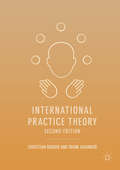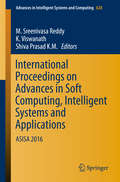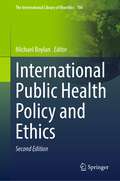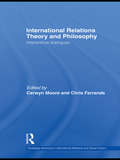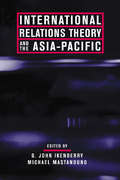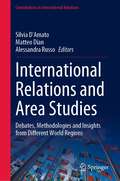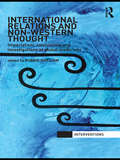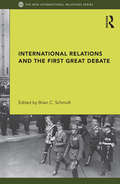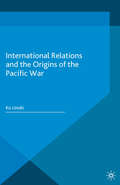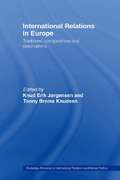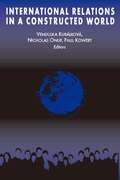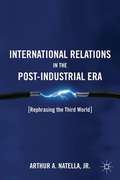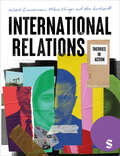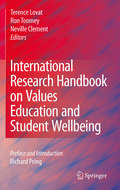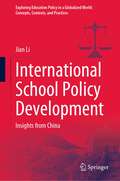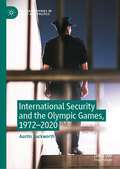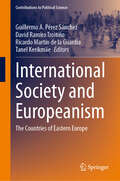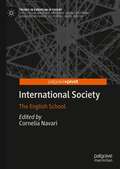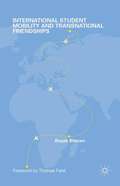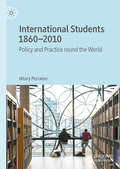- Table View
- List View
International Political Thought: A Historical Introduction
by Edward KeeneThis volume offers an accessible and wide-ranging introduction to the history of international political thought. Taking as its starting-point the various concepts people have used to think about differences between political communities, the book explores changing perceptions of international politics from antiquity to the twentieth century. As well as discussing well-known themes such as relations between independent sovereign states and the tension between raison d'etat and a universal code of natural law, it also examines less familiar ideas which have influenced the development of international political thought such as the distinction between civilization, national culture and barbarism, religious attitudes towards infidels, and theories about racial difference and imperialism. Among the key thinkers covered are Thucydides, Machiavelli, Hobbes, Kant, Marx and Morgenthau, alongside less commonly studied figures such as Herodotus, Pope Innocent IV, Herder, Constant and Zimmern. Each chapter concludes with a guide to further reading which will help students to develop a more detailed understanding of the subject. Written with the beginner student in mind, this lively textbook is an ideal introduction for anyone studying international political thought.
International Politics and Performance: Critical Aesthetics and Creative Practice (Interventions)
by Jenny Edkins Adrian KearIn recent years we have witnessed an increasing convergence of work in International Politics and Performance Studies around the troubled, and often troubling, relationship between politics and aesthetics. Whilst examination of political aesthetics, aesthetic politics, and politics of aesthetic practice has been central to research in both disciplines for some time, the emergence of a distinctive ‘performative turn’ in International Politics and a critical return to the centrality of politics and the concept of ‘the political’ in Performance Studies highlights the importance of investigating the productivity of bringing the methods and approaches of the two fields of enquiry into dialogue and mutual relation. Exploring a wide range of issues including rioting, youth-driven protests, border security practices and the significance of cultural awareness in war, this text provides an accessible and cutting edge survey of the intersection of international politics and performance examining issues surrounding the politics of appearance, image, event and place; and discusses the development and deployment of innovative critical and creative research methods, from auto-ethnography to site-specific theatre-making, from philosophical aesthetics to the aesthetic thought of new securities scenario-planning. The book’s focus throughout is on the materiality of performance practices—on the politics of making, spectating, and participating in a variety of modes as political actors and audiences—whilst also seeking to explicate the performative dynamics of creative and critical thinking. Structured thematically and framed by a detailed introduction and conclusion, the focus is on producing a dialogue between contributors and providing an essential reference point in this developing field. This work is essential reading for students of politics and performance and will be of great interest to students and scholars of IR, performance studies and cultural studies.
International Politics of the Arctic: Coming in from the Cold (Routledge Advances in International Relations and Global Politics)
by Peter HoughThis book offers a wide-ranging account of the emerging issues of international politics in the Artic, and the emerging Geopolitical debates that surround the region. In this thorough but accessible book covering environmental issues, the author examines the Geopolitics of emerging land and resource disputes and the rise of both nationalist and pan-Arctic movements in the region. Whereas existing literature on the politics of the Arctic tends to focus either on the environment or on Geopolitical interests, this book considers both of these themes in addition to the politics of the region’s indigenous peoples and provides an overview on the emerging issues of international politics in the Arctic. The book makes full use of pedagogic features such as maps, diagrams, timelines, biographies and boxes highlighting key concepts and issues in order to make this an accessible book for both students and scholars alike. This book will be of interest to students and scholars of International Relations, Arctic Politics, Environmental Politics and European Politics.
International Practice Theory: Core Approaches
by Frank Gadinger Christian BuegerInternational Practice Theory is the definitive introduction to the practice turn in world politics, providing an accessible, up-to-date guide to the approaches, concepts, methodologies and methods of the subject. Situating the study of practices in contemporary theory and reviewing approaches ranging from Bourdieu’s praxeology and communities of practice to actor-network theory and pragmatic sociology, it documents how they can be used to study international practices empirically. The book features a discussion of how scholars can navigate ontological challenges such as order and change, micro and macro, bodies and objects, and power and critique. Interpreting practice theory as a methodological orientation, it also provides an essential guide for the design, execution and drafting of a praxiographic study.
International Proceedings on Advances in Soft Computing, Intelligent Systems and Applications
by K. Viswanath M. Sreenivasa Reddy Shiva Prasad K.M.The book focuses on the state-of-the-art technologies pertaining to advances in soft computing, intelligent system and applications. The Proceedings of ASISA 2016 presents novel and original work in soft computing, intelligent system and applications by the experts and budding researchers. These are the cutting edge technologies that have immense application in various fields. The papers discuss many real world complex problems that cannot be easily handled with traditional mathematical methods. The exact solution of the problems at hand can be achieved with soft computing techniques. Soft computing represents a collection of computational techniques inheriting inspiration from evolutionary algorithms, nature inspired algorithms, bio-inspired algorithms, neural networks and fuzzy logic.
International Public Health Policy and Ethics (The International Library of Bioethics #106)
by Michael BoylanThis second edition of International Public Health Policy and Ethics complements the popular first edition with contemporary problems in international public health. It brings together philosophers and practitioners to address the foundations and principles upon which public health policy may be advanced – especially in the international arena. What is the basis that justifies public health in the first place? Why should individuals be disadvantaged for the sake of the group? How do policy concerns and clinical practice work together and work against each other? Can the boundaries of public health be extended to include social ills that are amenable to group-dynamic solutions? What about political issues? How can international finance make an impact? These are some of the crucial questions that form the core of this volume of original essays sure to cause practitioners to engage in a critical re-evaluation of the role of ethics in public health policy. With a targeted new essay dealing with COVID and public health issues in Africa this second edition provides a resource building on the first edition.
International Relations Theory and Philosophy: Interpretive dialogues (Routledge Advances in International Relations and Global Politics)
by Cerwyn MooreThis book discusses the contribution of philosophers and thinkers whose ideas have recently begun to permeate international relations theory. It provides an introduction to the contemporary debates regarding theories and methodologies used to study international relations, particularly the relationships between interpretive accounts of social action, European philosophical traditions, hermeneutics and the discipline of international relations. The authors provides a platform for dialogue between theorists and researchers engaged in a more specific area studies, geo-political studies, political theory and historical accounts of international politics. The volume analyzes a variety of theoretical and explores the work of Nietzsche, Heidegger, Gramsci, Wittgenstein, Gadamer, Levinas, Bakhtin, Patocka, Derridean, Deleuze and Susan Sontag. Making an important contribution to discussions about how to study the complexities of world politics, this book will be of interest to students and researchers of international relations, politics, sociology, philosophy and political theory.
International Relations Theory and the Asia-Pacific
by Michael Mastanduno G. John. Ikenberry Eds.What will the Asia-Pacific rim look like in the years ahead? What tools will international relations theorists need to understand the complex relationship among China, Japan, and the United States as the three powers shape the economic and political future of this crucial region?Some of the best and most innovative scholars in international relations and Asian area studies gather here with the working premise that stability in the broader Asia-Pacific region is in large part a function of the behavior of, and relationships among, these three major powers. Each author analyzes the foreign policy behavior of one or more of these states and/or relations among them in an effort to make claims about the prospects for regional stability. Some of the chapters focus on security relationships, some on economic relations, and some on the interaction of the two. The authors do not promote any particular theoretical perspective, but instead draw on the full diversity of theoretical approaches in contemporary international relations scholarship to illuminate international interactions among the Pacific powers.The creative collaboration of international relations and Asian studies specialists presents the opportunity to assess the applicability of Western categories of analysis to the beliefs and behaviors of Asian actors. The scholars in this volume share the conviction that a deeper understanding of the effects of cultural divides between Asian and American policymakers is essential if the Pacific rim's economic and regional security is to be safeguarded.
International Relations Theory and the Asia-Pacific
by Michael Mastanduno G. John. IkenberryWhat tools will international relations theorists need to understand the complex relationship among China, Japan, and the United States as the three powers shape the economic and political future of this crucial region? Some of the best and most innovative scholars in international relations and Asian area studies gather here with the working premise that stability in the broader Asia-Pacific region is in large part a function of the behavior of, and relationships among, these three major powers.
International Relations and Area Studies: Debates, Methodologies and Insights from Different World Regions (Contributions to International Relations)
by Matteo Dian Alessandra Russo Silvia D'AmatoDiscover the intricate tapestry of international politics and governance with this book. The book delves into the diverse nature of globally significant actors and systems across multiple regions. From Africa to Asia, Europe to the Middle East, this collection of thought-provoking case studies explores the role of regional actors in the international system. Combining theoretical innovation with empirical analysis, this volume expands the boundaries of International Relations (IR) and Area Studies (AS), showcasing their interconnections throughout history and in contemporary contexts. Through illuminating case studies drawn from the fields of "Comparative Regionalism" and "Non-Western IR Theory," the book sheds light on pressing international events. Unpacking complex questions, the contributors examine the application of IR scholarship to global events and provide fresh insights into political dynamics, conflicts, and state instability across various regions. By offering a comparative perspective on threats, political contestation, and security policies, this book challenges existing perspectives and enriches the debate. With its methodological and epistemological explorations, this book is an indispensable resource for scholars and students of international relations and security studies, as well as researchers focusing on specific world areas. Embark on a captivating journey through the multifaceted landscape of global affairs.
International Relations and Non-Western Thought: Imperialism, Colonialism and Investigations of Global Modernity (Interventions)
by Robbie ShilliamInternational Relations, as a discipline, tends to focus upon European and Western canons of modern social and political thought. Alternatively, this book explores the global imperial and colonial context within which knowledge of modernity has been developed. The chapters sketch out the historical depth and contemporary significance of non-Western thought on modernity, as well as the rich diversity of its individuals, groups, movements and traditions. The contributors theoretically and substantively engage with non-Western thought in ways that refuse to render it exotic to, superfluous to or derivative of the orthodox Western canon of social and political thought. Taken as a whole, the book provides deep insights into the contested nature of a global modernity shaped so fundamentally by Western colonialism and imperialism. Now, as ever, these insights are desperately needed for a discipline that is so closely implicated in Western foreign policy making and yet retains such a myopic horizon of inquiry. This work provides a significant contribution to the field and will be of great interest to all scholars of politics, political theory and international relations theory.
International Relations and the First Great Debate (New International Relations)
by Brian C. SchmidtThis book provides an authoritative account of the controversy about the first great debate in the field of International Relations. Of all the self-images of International Relations, none is as pervasive and enduring as the notion that a great debate pitting idealists against realists took place in the 1940s. The story of the first great debate continues to structure the contemporary identity of International Relations, yet in recent years revisionist historians have challenged the conventional wisdom that the field experienced such a debate. Drawing on expert contributors working in Canada, Europe, the United Kingdom, and the United States, this book includes key participants in the historiographical controversy. The book assembles the existing scholarship and provides a thorough analysis of the status of the first great debate in the history of International Relations. It is an invaluable examination of the causes and future direction of idealist and realist arguments. International Relations and the First Great Debate will be of interest to students and scholars concerned with the foundations of International Relations.
International Relations and the Origins of the Pacific War
by Ko UnokiInternational Relations and the Origins of the Pacific War takes the unique approach of examining the history of the relationship between Japan and the United States by using the framework of international relations theories to search for the origins of the Pacific War, that erupted with Japan's attack on Pearl Harbour in 1941.
International Relations in Europe: Traditions, Perspectives and Destinations (Routledge Advances in International Relations and Global Politics #Vol. 44)
by Knud Erik Jørgensen Tonny Brems KnudsenA new and illuminating critical examination of international relations in Europe. This new volume presents all of the state of the art thinking, focusing particularly on international relations theory and theoretical debates in Western and Central European countries.The contributors seek to strengthen knowledge about different ways of cultivating the discipline; to intensify pan-European communication concerning IR theory; to contribute to improving the quality of theorizing; and finally to consider future directions for the discipline in Europe. The main issues addressed include: the historical development of the discipline; factors driving IR theorizing; the institutional and cultural context of theorizing; 'homegrown' theory-building vs. theory import; patterns of traditional and new discourse; and the diversity of disciplinary traditions.
International Relations in a Constructed World
by Vendulka KubalkovaExplores the application of constructivist theory to international relations. The text examines the relevance of constructivism for empirical research, focusing on some of the key issues of contemporary international politics: ethnic and national identity; gender; and political economy.
International Relations in the Post-Industrial Era
by Jr. Arthur A. NatellaThe current emphasis on the greening of the world marks a beginning of a new concern for our relationship with our planet. This book states that we are entering into a new era - a transitional time in history in which the values of the industrial revolution are being replaced by a post-industrial consciousness.
International Relations: Theories in Action
by Hubert Zimmermann Milena Elsinger Alex BurkhardtThe definitive applied theory textbook that helps you make sense of global issues through theoretical concepts. Not presupposing any prior knowledge, this introduction equips you with the skills to use theories as adaptable tools to tackle complex global issues. Adopting a critical and questioning approach, you will be equipped in theory as a series of tools to be used, adapted, combined, and applied when grappling with some of the most contested issues in global politics. Theoretical perspectives are brought alive as a vital tool to understand concrete historical and contemporary examples. This indispensable text starts by examining key theories spanning constructivism and postcolonialism to realism and liberalism with a real-world perspective which prioritises empirical purchase. From here, chapters take a critical, questioning approach to tackle core problems of international politics – from armed conflict and financial markets to the climate crisis, global inequality, gender and race. This text is the ideal companion for all undergraduate and postgraduate students of global affairs. Hubert Zimmermann is Professor of International Relations at Philipps University of Marburg, Germany. Milena Elsinger is Head of the student information department at Philipps University of Marburg, Germany. Alex Burkhardt teaches at the Bundessprachenamt in Koblenz, Germany and previously taught at Philipps University Marburg, Germany.
International Relations: Theories in Action
by Hubert Zimmermann Milena Elsinger Alex BurkhardtThe definitive applied theory textbook that helps you make sense of global issues through theoretical concepts. Not presupposing any prior knowledge, this introduction equips you with the skills to use theories as adaptable tools to tackle complex global issues. Adopting a critical and questioning approach, you will be equipped in theory as a series of tools to be used, adapted, combined, and applied when grappling with some of the most contested issues in global politics. Theoretical perspectives are brought alive as a vital tool to understand concrete historical and contemporary examples. This indispensable text starts by examining key theories spanning constructivism and postcolonialism to realism and liberalism with a real-world perspective which prioritises empirical purchase. From here, chapters take a critical, questioning approach to tackle core problems of international politics – from armed conflict and financial markets to the climate crisis, global inequality, gender and race. This text is the ideal companion for all undergraduate and postgraduate students of global affairs. Hubert Zimmermann is Professor of International Relations at Philipps University of Marburg, Germany. Milena Elsinger is Head of the student information department at Philipps University of Marburg, Germany. Alex Burkhardt teaches at the Bundessprachenamt in Koblenz, Germany and previously taught at Philipps University Marburg, Germany.
International Research Handbook on Values Education and Student Wellbeing
by Terence Lovat Neville Clement Ron ToomeyInformed by the most up-to-date research from around the world, as well as examples of good practice, this handbook analyzes values education in the context of a range of school-based measures associated with student wellbeing. These include social, emotional, moral and spiritual growth - elements that seem to be present where intellectual advancement and academic achievement are being maximized. This text comes as 'values education' widens in scope from being concerned with morality, ethics, civics and citizenship to a broader definition synonymous with a holistic approach to education in general. This expanded purview is frequently described as pedagogy relating to 'values' and 'wellbeing'. This contemporary understanding of values education, or values and wellbeing pedagogy, fits well with recent neuroscience research. This has shown that notions of cognition, or intellect, are far more intertwined with social and emotional growth than earlier educational paradigms have allowed for. In other words, the best laid plans about the technical aspects of pedagogy are bound to fail unless the growth of the whole person - social, emotional, moral, spiritual and intellectual, is the pedagogical target. Teachers and educationalists will find that this handbook provides evidence, culled from both research and practice, of the beneficial effects of such a 'values and wellbeing' pedagogy.
International School Policy Development: Insights from China (Exploring Education Policy in a Globalized World: Concepts, Contexts, and Practices)
by Jian LiThis book investigates the international school policy reform in China from various perspectives. In recent years, international schools, international classes, international departments, and various international education projects have emerged in the field of education in China. This book explores and analyzes the idea of international schools, and discusses different aspects of the conceptual model of international education policy development in China, including international school policy, student cultivation, teacher cultivation, school management, curriculum, and quality assessment of international schools. In addition, this book offers a comprehensive, systematic, and practical perspective on shaping China’s international school policy development and management. This book serves as a guide for scholars and researchers who are interested, and work in, research on internationalization development in China, administrators, and stakeholders in China's education system, and graduate students who major or minor in the field of internationalization development in China.
International Security and the Olympic Games, 1972–2020 (Palgrave Studies in Sport and Politics)
by Austin DuckworthDrawing on new archival documents and interviews, this book demonstrates the evolving role of international politics in Olympic security planning. Olympic security concerns changed forever following the terrorist attack on Israeli athletes at the 1972 Munich Olympic Games. The International Olympic Committee’s (IOC) choice to ignore security after the attack in Munich left individual Olympic Games Organizing Committees to organize, fund, and provide security for the major international event. Future Olympic hosts planned security amidst increasing numbers of international terrorist attacks, and with the Cold War in full swing. For some Olympic hosts, Olympic security now represented their nation’s largest ever military operations. By the time the IOC made security more of a priority in the early 1980s, the trends in Olympic security were set for the future.
International Society and Europeanism: The Countries of Eastern Europe (Contributions to Political Science)
by Tanel Kerikmäe David Ramiro Troitiño Ricardo Martín de la Guardia Guillermo A. Pérez SánchezThis pioneering volume examines Europeanism in the new international society that emerged after the First World War through the League of Nations, with a focus on the countries of Central and Eastern Europe (CEE), the Baltic countries, and the Balkans. The book analyzes how Europeanism was consolidated as an argument for the future, especially after the Second World War, when the three strong ideas of Europeanism came to fruition: peace among Europeans, good democratic government, and the socioeconomic welfare of peoples. By doing so, this book offers a comprehensive overview of the evolution of Europeanism and its positive influence in the countries of Eastern Europe, from the interwar period to the present day. The book will appeal to researchers, students, and scholars of political science, international relations, European studies, and history, as well as policy-makers interested in a better understanding of Europeanism and the European integration process of the CEE, Baltic, and Balkan countries.
International Society: The English School (Trends in European IR Theory)
by Cornelia NavariThis book provides an introduction to, and analysis of, the English School’s views on International Relations as they developed from the somewhat vague state/ society distinction to the present focus on foundation institutions, regional organisation and the globalization of international society. It focuses on key thinkers and texts and turning points and moves our understanding of the English School beyond the past work of the British Committee to the more recent work of Barry Buzan et. al. to offer a comprehensive overview and interrogation from the leading lights of this arm of International Relations thought. This volume is one of the cornerstones of the EISA’s Trends in European IR Theory series complementing the volumes on International Political Theory, Liberalism, Realism, International Political Economy, the post-positivist tradition, and Feminism published for the centenary of IR as a discipline.
International Student Mobility and Transnational Friendships
by Basak BilecenFriends play a crucial role in international students' lives. This book explores the characteristics of the friendship networks of international doctoral students by analysing the relationships between these students and their friends, both in the country of education and across several national borders.
International Students 1860–2010: Policy and Practice round the World
by Hilary PerratonThis book describes how the number of international students has grown in 150 years, from 60,000 to nearly 4 million. It examines the policies adopted towards them by institutions and governments round the world, exploring who travelled, why, and who paid for them. In 1860 most international students travelled within Europe; by 2010 the largest numbers were from Asia. Foreign students have shaped the universities where they studied, been shaped by them, and gone on to change their own lives and societies. Policies for student mobility developed as a function of student demand and of institutional or national interest. At different times they were influenced by the needs of empire, by the cold war, by governments' search for soft power, by labour markets, and by the contribution students made to university finance. Along with university students, others travelled abroad to study: trainee nurses, military officers, the most deprived and the most privileged schoolchildren. All their stories are a vital part of the world's history of education and of its broader social and political history.
